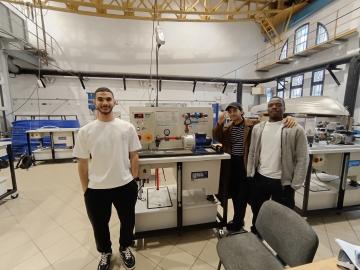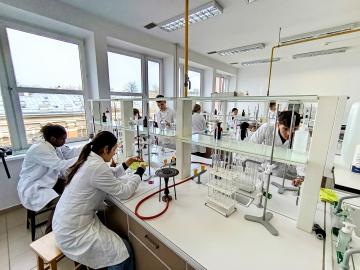Environmental Engineering
B.Sc. Environmental Engineering
Faculty of Environmental Engineering
Duration: 4 years
Starts in: October
The major objective of the Environment Engineering Programmes is to provide high quality, interdisciplinary knowledge and skills to people searching for solutions to the environmental problems of today and the future, concerning: water resources protection, air pollution control, solid waste management, environmental impact assessment, renewable energy systems, and others.
At the undergraduate level of Environmental Engineering, principal engineering skills are taught together with the achievement of knowledge of basic subjects such as mathematics, physics, chemistry, and biology. All the students of the Faculty are given general knowledge of processes in major constituents of the environment as well as in basic environmental technologies, e.g.: atmospheric physics and chemistry, air pollution control, hydrology, water resources and water protection, water and sewage processing, groundwater, soil protection and land reclamation, waste management. Modern methods of natural resources protection through the use of the best available technologies and production practices, recycling, and reuse of wastes are thoroughly taught. In addition, environmental aspects of energy production and use are stressed throughout all engineering courses. Students are also familiar with some global environmental issues such as climatic change, ozone layer depletion, land-use changes, and global water scarcity and contamination.
The first three semesters of the program provide students with basic knowledge of mathematics, physics, chemistry, and biology at the university level. In addition, several engineering basic courses are offered to give students a comprehensive understanding of environmental issues. The next four semesters cover specific topics within the field of environmental engineering. The eighth semester is mainly devoted to the professional internship, working on the final project, and preparation of the B.Sc. thesis, in which students use their knowledge to analyze and find a proper solution to a given problem.
Examples of modules:
• Biology and Ecology
• Information Technology
• Strength of Materials and Structural Mechanics
• Material Engineering
• Fluid Mechanics
• Civil Engineering and Constructions
• Statistics in Environmental Sciences
• Hydrology • Meteorology
• Soil Protection
• Engineering Hydrology and Hydrogeology
• Environmental Chemistry
• Air Pollution Control
• Solid Waste Management
• Water Resources Protection
• Municipal and Industrial Wastewater Treatment
• Renewable Energy Systems


